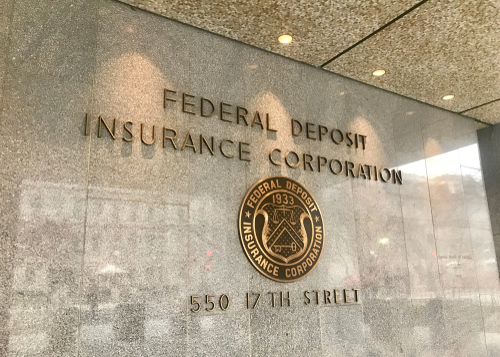The Federal Deposit Insurance Corporation (FDIC) on Tuesday adopted a final rule to increase deposit insurance assessment rates by 2 basis points for all banks beginning in the first quarter next year.

As of June 30, 2020, near the start of the pandemic, the reserve ratio of the FDIC’s Deposit Insurance Fund (DIF) fell below its statutory minimum as bank deposits surged. The final rule is intended to increase the likelihood that the reserve ratio of the DIF returns to the statutory floor set by Congress of 1.35 percent by the statutory deadline of September 30, 2028. The FDIC said the final rule also reduces the likelihood that it would need to consider raising assessments when banking and economic conditions may be less favorable.
“Strengthening the DIF is important because the banking industry faces significant downside risks,” said FDIC Acting Chairman Martin Gruenberg. “Future economic and banking conditions remain uncertain due to high inflation, rising interest rates, slowing economic growth, and geopolitical uncertainty. Any of these uncertainties could present challenges and have longer-term effects on the condition and performance of the economy and the banking industry. It is better to take prudent but modest action earlier in the statutory 8-year period to reach the minimum reserve ratio, than to delay and potentially have to consider a pro-cyclical assessment increase.”
The FDIC expects the increase in assessment rates to have an “insignificant” effect on institutions’ capital levels, and it estimates that banks’ income will be reduced by an annual average of 1.2 percent.
Consumer Financial Protection Bureau (CFPB) Director Rohit Chopra, a member of the FDIC Board of Directors, noted the DIF has gone broke twice in the last three decades. “… The modest two basis point adjustment dramatically reduces the likelihood of a much more substantial increase later in order to comply with the deadline set by existing law.”
“Of course, none of our insured banks want to pay higher premiums,” Chopra added. “However, failing to take this step would be a gamble and risks violating the law governing the Deposit Insurance Fund.”
A group of House Republicans expressed concerns this week about the FDIC increasing assessment rates for banks. The GOP lawmakers stated it would have a negative impact on access to credit for consumers and businesses, particularly in the current economic environment.
“…[W]e are concerned that an increase in the assessment rate at this time could pose real harm to consumers, particularly those with low and moderate incomes who may need access to credit. It is in their best interests to allow the fund to naturally recover over time as deposits run off,” the members of Congress wrote to the heads of the FDIC, Comptroller of the Currency, and Consumer Financial Protection Bureau on Oct. 17.
The letter was signed by U.S. Reps. Blaine Luetkemeyer (R-MO), Ann Wagner (R-MO), Andy Barr (R-KY), Bill Huizenga (R-MI), and Tom Emmer (R-MN).